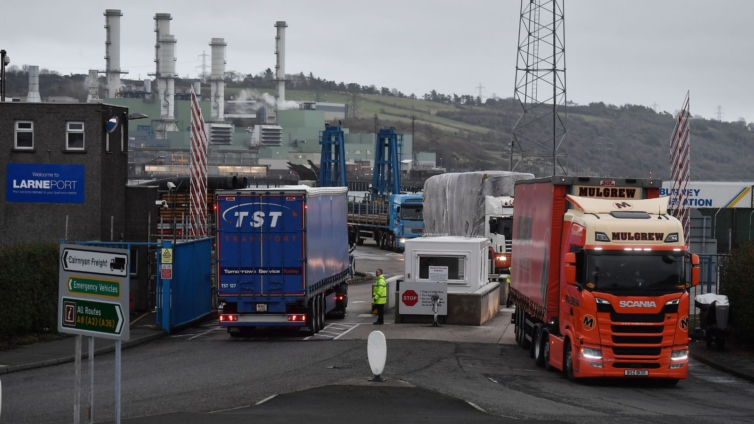
Audio By Carbonatix
The British government estimates it will spend at least 4.7 billion pounds ($6 billion) on implementing post-Brexit border arrangements, after repeated delays in setting new rules, parliament's spending watchdog said on Monday.
Britain voted to leave the European Union in 2016 but, such was the scale of the task to untangle supply chains and erect customs borders, that it is only this year setting new rules.
The first phase of Britain's so-called new Border Target Operating Model, requiring additional certification, came into force on Jan. 31.
A second phase started on April 30, introducing physical checks at ports. A third phase, requiring safety and security declarations is slated for Oct. 31.
The National Audit Office (NAO) said the 4.7 billion pounds figure is the amount the government forecasts it will spend on the 13 most significant programmes to manage the passage of goods across the border post-Brexit and improve performance over the lifetime of the programmes.
The government delayed the implementation of full controls five times since the end of the EU exit transition period on Dec. 31 2020.
This caused uncertainty for businesses, extra costs for government and ports and increased the biosecurity risk to the UK, the NAO said.
"The repeated delays in introducing import controls, and difficulties forecasting requirements, have resulted in government expenditure on infrastructure and staff that were ultimately not needed," it said.
"Late announcements about policy and uncertainty about the implementation of controls have also reduced the ability of businesses and ports to prepare for changes."
The NAO noted that while post-EU exit border processes have operated "relatively smoothly", businesses trading goods between the UK and the EU have faced additional costs and administrative burdens.
The watchdog was also critical of the government's 2025 UK Border Strategy, which was published in 2020, saying it "lacks a clear timetable and an integrated cross-government delivery plan, with individual departments leading different aspects of implementation."
The government also needed "a more realistic approach" to digital transformation, the NAO said.
($1 = 0.7895 pounds)
Latest Stories
-
Ghana is rising again – Mahama declares
4 hours -
Firefighters subdue blaze at Accra’s Tudu, officials warn of busy fire season ahead
5 hours -
New Year’s Luv FM Family Party in the park ends in grand style at Rattray park
5 hours -
Mahama targets digital schools, universal healthcare, and food self-sufficiency in 2026
5 hours -
Ghana’s global image boosted by our world-acclaimed reset agenda – Mahama
6 hours -
Full text: Mahama’s New Year message to the nation
6 hours -
The foundation is laid; now we accelerate and expand in 2026 – Mahama
6 hours -
There is no NPP, CPP nor NDC Ghana, only one Ghana – Mahama
6 hours -
Eduwatch praises education financing gains but warns delays, teacher gaps could derail reforms
6 hours -
Kusaal Wikimedians take local language online in 14-day digital campaign
7 hours -
Stop interfering in each other’s roles – Bole-Bamboi MP appeals to traditional rulers for peace
7 hours -
Playback: President Mahama addresses the nation in New Year message
8 hours -
Industrial and Commercial Workers’ Union call for strong work ethics, economic participation in 2026 new year message
10 hours -
Crossover Joy: Churches in Ghana welcome 2026 with fire and faith
10 hours -
Traffic chaos on Accra–Kumasi Highway leaves hundreds stranded as diversions gridlock
10 hours

